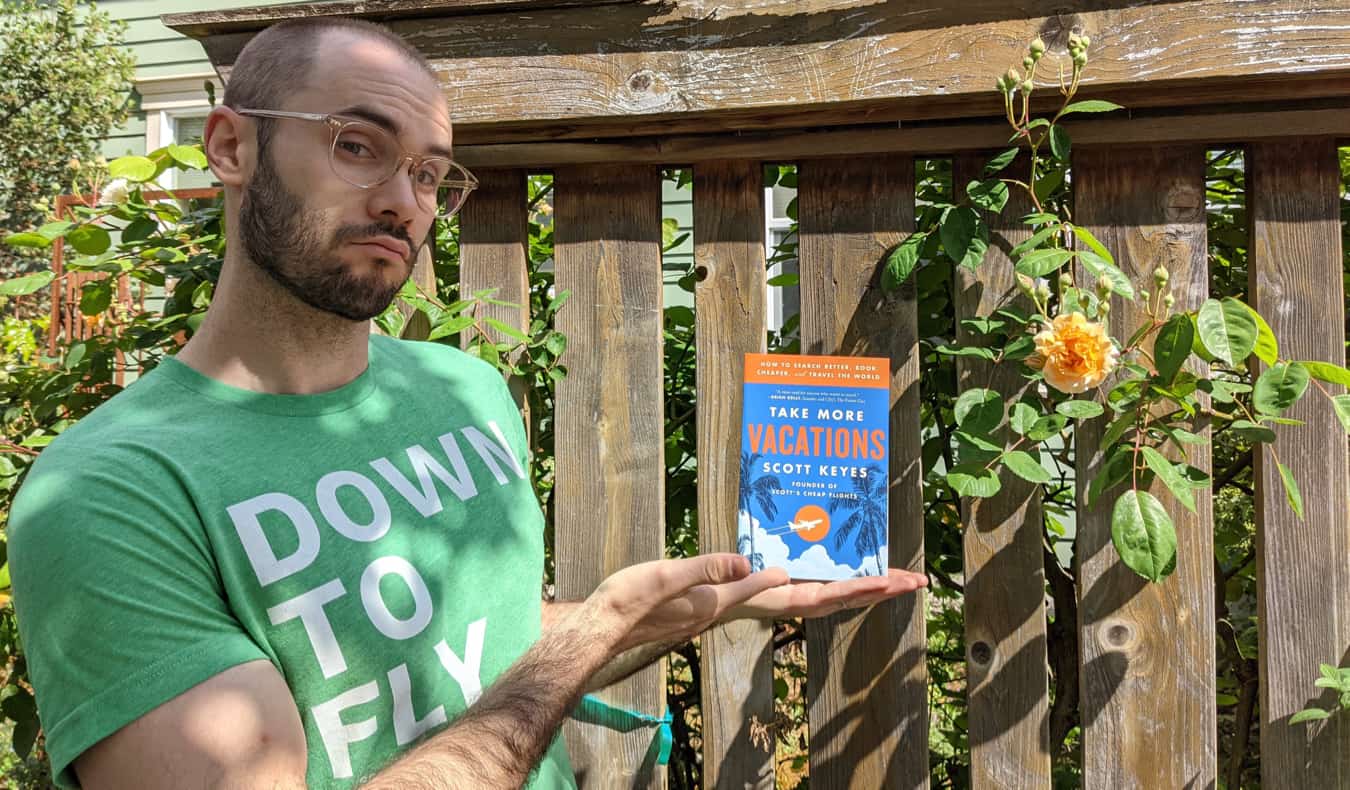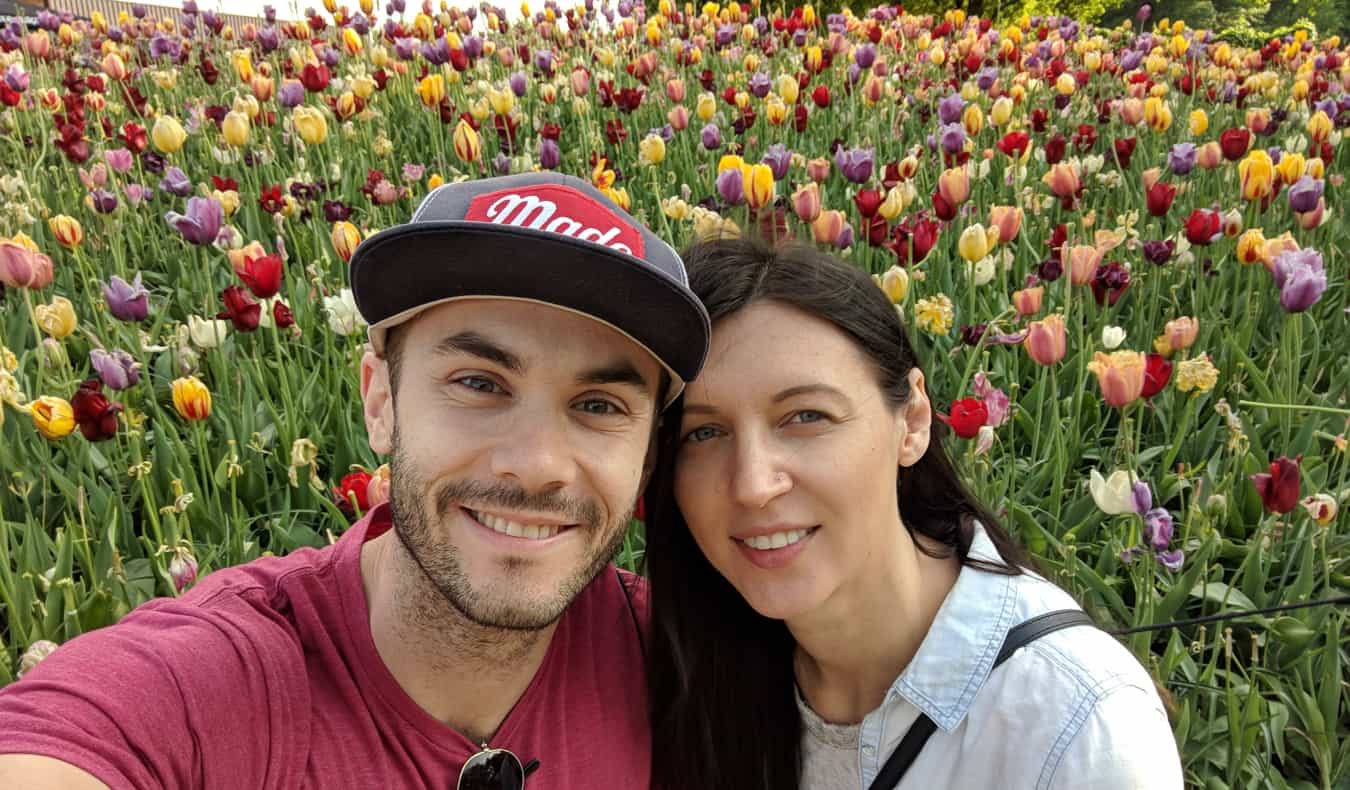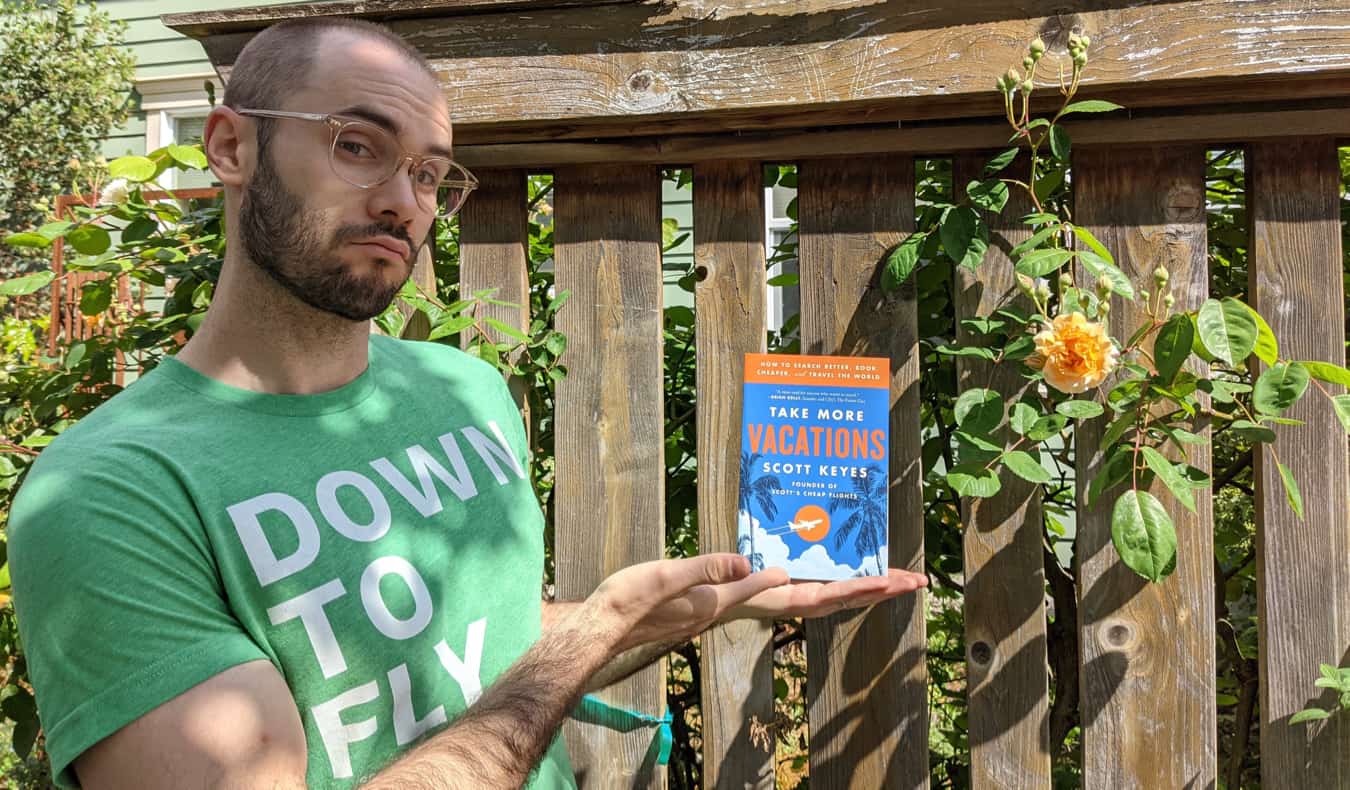
Posted: 5/17/21 | May 17th, 2021
Scott’s Cheap Flights is one of the biggest and best deal-finding websites on the internet. I check them regularly when I’m on the hunt for a new trip. They are just unmatched in the deals they find (at least for the US market). Its founder, Scott Keyes, recently wrote a book sharing all his insider tips and tricks called Take More Vacations: How to Search Better, Book Cheaper, and Travel the World. (Disclosure: I blurbed it. It’s really good.)
Over the years, Scott and I have become friends because of our mutual love of saving money when we travel. I sat down with him to talk about his book, the secrets to finding cheap flights, and what to expect in a post-COVID world. (While some of his tips are US centric, for those outside the states, there’s still some information here you’ll find useful.)
Nomadic Matt: Tell everyone about yourself. How did you get into this?
Scott: After I graduated college and began working as an underpaid journalist, I realized that my hopes of traveling overseas were entirely dependent on my ability to find cheap flights. I threw myself into the subject, researching and testing and figuring out why airfare behaves the way it does and all the things one can do to get the best possible price on flights.
It all culminated in 2013 when I stumbled upon the best deal I’ve ever personally gotten in my life: nonstop from NYC to Milan for $130 roundtrip. Though I’d had no plans to visit Milan, when I saw that fare it was, of course, a total no-brainer. There’s nowhere in the world I wouldn’t go for $130 roundtrip!
When I got back from that flight, word had spread to my friends and coworkers, and one-by-one they kept coming up to me with the same request: “Hey Scott, next time you find a deal like that, can you let me know so I can get it, too?” By the time the 8th person had asked me, I realized I wasn’t going to be able to remember everyone I needed to let know, so I turned to the simplest solution: start a simple little email list. I had no idea at the time, but in that moment, Scott’s Cheap Flights was born.
Why did you write this book?
There’s this weird conundrum in our lives: we all want to travel more than we actually do.
I figured there could be two possible causes: time and money. Not enough time is certainly the case for many, but I don’t think that’s the case for most people. Turns out more than half of Americans don’t use all their vacation time, and collectively we leave around a billion vacation days unused every year.
Instead, it’s the expense and hassle of booking flights that stymie so many of our travel dreams. And that’s because airfare is the most uniquely torturous thing we buy. The fact that this thing we need in order to travel is so volatile and incomprehensible leads us to overpay for flights or, worse, pass up would-be trips.
Think of it this way: if you had a promo code that made all your future flights just $200 roundtrip, would you travel more than you do today? For most of us, that answer is yes.
In other words, unless you happen to have a trust fund, cheap flights are the key that opens up the world.
Who do you think Take More Vacations will be helpful for?
Anyone who dreams of traveling more than they actually do, and anyone who gets anxious every time they buy tickets because they have no idea how to avoid overpaying.
One of the biggest misconceptions in my world is that cheap flights have to be inconvenient flights. Not true! The flight that led to me starting Scott’s Cheap Flights, for example, was a nonstop United flight I found from New York City to Milan for $130 roundtrip, including two checked bags.
Similarly, another major fallacy is that cheap flights are only for people with complete flexibility. I devoted an entire chapter of Take More Vacations to the subject of flexibility because so often I see travelers unwittingly sacrifice their ability to get cheap flights by telling themselves “I don’t have flexibility.”
Of course, someone with complete flexibility has better your chances of scoring a good deal than someone whose dates and destinations are locked in stone. But one of the costliest mistakes people regularly make is thinking about flexibility as an on/off switch rather than a dimmer switch. “I don’t have flexibility” is a self-imposed trap that will ensure your travel dreams never become more than that. The more flexibility you can find for yourself, the better your odds of getting a cheap flight.
This book isn’t just for 22-year-olds taking a post-graduation trip to Europe. It’s for anyone hoping to travel more and better.


If it’s true that we’ve been living in the Golden Age of Cheap Flights, why do people so many people still overpay for airfare?
First and foremost, it’s because airfare behaves like nothing else we buy. When you buy bagels, the price is essentially the same on any given day, and it mostly depends on how many you buy. But when you buy flights, the price is extraordinarily volatile. The same flight that costs $800 today may cost $300 tomorrow and $1,300 the next day. And the price of a flight bears little relation to how far you travel. It generally costs more to fly from New York to Des Moines than from New York to Barcelona, for instance.
Given the complexity and volatility of airfare, cognitive biases cause us to overpay for flights. For instance, most of us employ loss aversion when we’re booking flights; we fear a $300 increase more than we relish a $300 drop, so we pull the trigger on an expensive flight because we’re worried it’ll get even more expensive.
Recency bias is another one; if the fare stays put for a while, we may pull the trigger because we figure that’s just what the trip costs, without realizing that fare is likely to soon change. There’s also sunk cost fallacy—we get invested in the idea of a specific trip, and despite expensive flights, refuse to consider elsewhere.
And finally, good old procrastination! We put off buying tickets too long and wind up booking flights last minute when they are, invariably, expensive.
Why do you think so many false myths about cheap airfare (buy on Tuesday, clear your cookies, etc) persist when they are so clearly wrong?
I think it’s because airfare is so confusing. Prices are constantly jumping around, seemingly at random, and sometimes fares seem to make no sense at all, like recently when flights from Pittsburgh to Tokyo were available for $316 roundtrip while a flight from Pittsburgh to Philadelphia cost $312 roundtrip.
That confusion leads people to see patterns that aren’t actually correct or helpful but seem to be a reasonable enough explanation. In the same way, a penny that comes up heads three times in a row isn’t actually “due” for tails on the fourth flip, people make inferences about airfare because it offers some solace for a difficult-to-understand purchase.
And, so even though, as I explain in Chapter 9, it’s not the case that clearing your cookies makes flights cheaper, and it’s not the case that flights are cheapest to book on Tuesday at 1pm, these myths persist because they explain what seems inexplicable. Fortunately, you and I are out here doing our best to mythbust!


In Chapter 3, you discuss how the way we’ve been searching for flights is backward. Tell us more about that.
Almost every overseas vacation I’ve taken in the past decade has been a trip I didn’t plan to take.
Roundtrip to Milan for $130. Osaka for $169. Barcelona $222. Brussels $225, twice.
I hadn’t planned to visit Italy or Japan or Spain before buying flights to those very countries. It’s not that I wasn’t interested in seeing those places—come on, it’s Europe and Japan—but, like most people, I have thousands of places I’d love to visit if airfare was no concern.
What prompted my interest in those specific trips, in other words, was the fact that fares had dropped so precipitously.
The way most of us book our flights is a three-step process that probably sounds familiar:
- Step 1: Pick your destination
- Step 2: Pick your dates
- Step 3: Check for flights
We say we want cheap flights, but by setting airfare as the least important priority, is it any surprise that so many of us end up overpaying for flights? Knowingly or not, the most expensive mistake we make when booking flights is choosing a trip rather than choosing a fare.
Fortunately, there’s a better way, and it’s elegantly simple: Take that same three-step process and flip it on its head.
- Step 1: See where there are cheap flights departing your home airport
- Step 2: Pick one of those cheap destinations
- Step 3: Pick one of the cheap dates
You’re allowed to have preferences, of course. I’m just encouraging you to put airfare in context. Few of us would go to a restaurant, reject the waiter’s offer to look at the menu, and order the ribeye with zero consideration for price or other options.
But that’s exactly what many of us do with flights.
We set our heart on one specific vacation, price be damned. If Prague is at the top of your list, would you still pay $1,000 for flights if you knew there were $250 flights to Paris?
What are three things you want people to take away from this book?
First, the way we traditionally search for flights is harming your ability to get a good deal. We all say we want cheap flights, but our normal way of searching for flights inadvertently undercuts our ability to get cheap flights.
Instead, in many cases, the secret to getting cheap fares—and thus getting three vacations for what you used to pay for one—simply boils down to making them the top priority. That doesn’t mean only traveling to nearby cities or taking inconvenient flights; on the contrary, with a better approach, you can fly almost anywhere with cheap (and good) flights.
Second, recognizing that airfare is exceptionally volatile. Destinations don’t have a single, stable price. Flights to Japan aren’t normally $202 roundtrip, except occasionally when they are (like they were just a few weeks ago). Today’s expensive flight may be tomorrow’s cheap one, and vice versa.
Finally, cheap flights don’t just save money; they lead to better trips by letting you experience more at your destination. They lead to more trips and boost your interim happiness because you know the next one isn’t far off. And they expand the types of places you visit and let you discover places that appeal to you personally, rather than the average tourist.
You’ve searched millions of flights. What are some of the crazy insights you’ve learned about airlines in that time?
My favorite part about airfare is the funny anomalies. For instance, we all think of Thanksgiving as an exceedingly expensive time to travel. And it is—for domestic flights. But Thanksgiving is actually a hidden gem for cheap international flights. That’s because all those people flying home to visit family and eat turkey are, by definition, not flying overseas. With less competition for international destinations, the fares are often quite cheap.
Similarly, I love the anomaly of how when you’re traveling somewhere remote, it can be cheaper to split your trip into multiple itineraries rather than one. I call this the Greek Island Trick.
Say, for instance, you want to fly from NYC to Santorini. If you search that route on Google Flights, fares often come back upwards of $1,600. But if you search for flights from NYC to Athens, those regularly go on sale for as little as $350 roundtrip. And once you’re in Athens, you can hop a ferry or budget flight on to Santorini for as little as $50. So by splitting your itinerary, you can wind up saving 75% off normal prices, and even take a few days to visit Athens before heading over to Santorini!


Where do you see airfare going in a post-COVID world? I see short-term deals but long-term increases. What are your thoughts?
There’s a lot of concern that as travel demand rebounds, that’ll be the end of cheap flights. But here’s why, on the contrary, I think the future of cheap flights looks really bright.
First, while the pandemic certainly woke many people up to how far airfare had fallen, what many people missed was that since 2015, we have been living in the Golden Age of Cheap Flights. The pandemic didn’t cause cheap fares. The pandemic *illuminated* cheap fares. So if a resurgence of travel interest leads to pre-covid airfares, we should be so lucky!
The reason I’m so bullish on the continued long-term availability of cheap flights is that airline business models have been revamped over the past few decades. Go back 40 years ago and airlines made most of their money on economy fares. Today, airlines make most of their money from other revenue streams: selling credit cards and miles, premium tickets like business class, corporate contracts, cargo, and so on. In other words, airlines can afford to sell you $250 flights to Europe or Japan because those fares are far less consequential to their bottom line than they used to be.
I think it’s likely we’ll see headlines over the next few months about average fares going up. Indeed, Airlines for America’s analysis already shows that average fares have been steadily increasing since February.
And yet, during that time period, we’ve found roundtrip fares like $124 to Hawaii, $378 to Greece, and $202 to Japan. The key point to remember next time you see a headline about flight prices increasing is this: You can’t book average fares. You can only book available fares.
Last question: You’re a man who takes a lot of flights. Do you have a favorite experience?
This is going to be sappy so I apologize in advance, but my favorite flight experience is flying with my young daughter. I’ve taken thousands of flights in my life, and while I still love being in the air, the magic has faded just a bit. But not for her! Everything about flying, from the seats to windows to the noise to the turbulence to the liftoff to the majestic views from 30,000 feet, getting to be reminded by her how special it is, and getting to experience it through her eyes, is incredibly fun.
Scott Keyes, is the founder and Chief Flight Expert of Scott’s Cheap Flights, a website that finds and shares the best flight deals on the web. He’s also the author of Take More Vacations: How to Search Better, Book Cheaper, and Travel the World, which is available on Bookshop and Amazon. When he’s not on a plane, you can find him at home in Portland, Oregon.
Book Your Trip: Logistical Tips and Tricks
Book Your Flight
Find a cheap flight by using Skyscanner. It’s my favorite search engine because it searches websites and airlines around the globe so you always know no stone is being left unturned.
Book Your Accommodation
You can book your hostel with Hostelworld. If you want to stay somewhere other than a hostel, use Booking.com as it consistently returns the cheapest rates for guesthouses and hotels.
Don’t Forget Travel Insurance
Travel insurance will protect you against illness, injury, theft, and cancellations. It’s comprehensive protection in case anything goes wrong. I never go on a trip without it as I’ve had to use it many times in the past. My favorite companies that offer the best service and value are:
Want to Travel for Free?
Travel credit cards allow you to earn points that can be redeemed for free flights and accommodation — all without any extra spending. Check out my guide to picking the right card and my current favorites to get started and see the latest best deals.
Need Help Finding Activities for Your Trip?
Get Your Guide is a huge online marketplace where you can find cool walking tours, fun excursions, skip-the-line tickets, private guides, and more.
Ready to Book Your Trip?
Check out my resource page for the best companies to use when you travel. I list all the ones I use when I travel. They are the best in class and you can’t go wrong using them on your trip.


